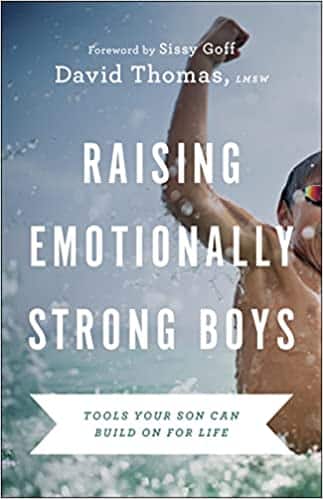
It can be tough to know how to support our teenagers during these challenging adolescent years.
There are times when boys, in particular, can stop communicating–and it can be tough on their parents.
We often wonder what is going on in their heads or what is happening behind that closed bedroom door.
It’s important to remember what is going on in your teenager’s brain.
The teenage years are a time of rapid development, both physically, mentally, and socially.
Their body is flooded with hormones. Their brain is trying to develop the skills to manage what life is throwing at them. And in all this complexity, they are faced with managing peer pressure, school stress, complicated friendships, and finding their place in this challenging world.
The result is heightened moodiness, edgy behavior, and irritability. Just a lot more attitude in general. And sometimes, it brings out the worst in us.
How can we support our teen sons during this rough transition
In preparing for this article, I decided to poll my teenage boys. I asked them, “What do teenagers need from their moms?”
In unison, they replied, “Money.”
While it’s easy to feel like a walking ATM for our kids during the teenage years, my boys did provide me with a little more insight into what they need from me as we navigate these complex parenting years.
Their feedback, coupled with my own insights, make up this list of nine things teen boys need from their moms during these tough teenage years. Of course, they need these things from both parents, but we’re focusing on moms today.
Nine things teen boys need from their moms
1. Food
It wasn’t surprising that food was at the top of their list and mine when thinking about the essentials of raising teen boys. And it isn’t just about having the fridge and snack pantry stocked. Food is the way to a teen boy’s heart.
Want to hear an “I love you so much, mom!”? Make his favorite dinner.
Throw jalapeno poppers in the oven when he gets home from school and share a snack.
Building relationships with our boys can be tough during these years, but food is a great connecting point and can feed their bodies and souls.
2. Real Life Skills
As a mom of teenagers, I’m constantly thinking about my boys’ futures. The time is NOW to prepare them for everyday, down-to-earth adulting, including lessons on cleaning a house, cooking, and caring for their bodies.
I’ve realized this is a long game. It takes years to teach a kid to load a dishwasher properly or to realize that the goal of sweeping a floor is to “get all the crumbs,” not “try really hard.”
But I’ll be damned if my boys can’t carry their own weight regarding household management. They will know how to wipe a counter after dinner, clean a toilet, fold their laundry, and vacuum the living room rug.
Housework is human work, and as young men, they need to fully live in this truth. I’m taking the responsibility of teaching them how to care for a home seriously.
In the same way, I want them to know how to feel comfortable in the kitchen and not just how to throw a frozen pizza in the oven. Sure, it takes time to teach them how to chop an onion (again, a long game), but I want my boys to be able to comfortably follow a recipe, meal prep, and cook an egg and a few killer recipes before they graduate from high school.
The life lessons extend to caring for their bodies too. Do you know how many “how to wash your hair” lessons I’ve given? How many reminders to “wear deodorant” I’ve doled out, how many times I’ve said, “You need to shower, I don’t care that you showered yesterday, yes, it’s time again!”?
Every teen boy’s mom knows this struggle.
But they need to hear these reminders and lessons over and over again from their moms (and dads) so that our boys can know to take care of their bodies.
One day, the words will stick, right? (right?!)
3. Creative communication
I once asked my son how his day was, and he said, “Good.”
Frustrated with his lack of communication, I said, “Can you use a full sentence, please?”
And he replied, “It was really good.”
Communicating with our teen boys can feel like pulling teeth, only to get a “fine,” a grunt, or “whatever” from our efforts.
Utilizing digital communication like texting can be a great way to bridge the gap with our teen boys. It’s a medium they already like, and it cuts out the “face-to-face” time that can feel awkward or even intrusive to teens.
Some of my best and most intimate conversations with my boys have happened via text, and I’m so thankful for the heart-to-hearts that have been made possible through technology.
Sending funny memes, gifs, and reels can also help build rapport with your teen too, especially if your relationship has been tense. Humor is such a great relationship builder, especially with our adolescent boys.
4. Interest in their world
Teen boys need their moms to show an interest in their world, but this can be challenging as they grow older. The gap between female and male/mom and son desires and interests seems to grow wider as they grow older.
Their all-consuming interest in sports, video games, favorite anime shows, or youtube stars can make a mom feel like she’s on an island without a canoe, desperate for connection but confused about how to start.
You may not know anything about football or lacrosse, or Call of Duty or My Hero Academia, but showing an interest in the things your boys are passionate about means the world to them.
Resist the urge to roll your eyes, call their interest an “obsession” or “your little game”—instead, enter into their world. Ask questions. Be willing to go the extra mile.
I’m not into graphic print t-shirts, but when my marching band-loving son sent me a link to a “I’m just here for the half-time show” and “I’m a Band Mom” shirts, I knew he was trying to connect.
He was asking me to enter into his world. And I’m sure as heck ordering myself some Band Mom shirts for next football season.
5. Mental health support
Although our society is starting to make strides in supporting male mental health struggles, we still have a long way to go. It starts with encouraging boys to be more in touch with their emotions.
We can have such a positive effect on shaping our young men’s emotional vocabularies and helping them understand their mental health triggers and needs before they become adults.
To start, we can give our boys the vocabulary to talk about their inner life that goes beyond “sad, mad, glad,” and “man up.” If our teens can’t talk about their inner life, struggles, stresses, and emotions, these bottled-up emotions can metastasize and manifest themselves in mental health struggles like anxiety and depression or even come out as rage or violence.
If we want to raise men who are emotionally and mentally healthy, self-controlled, loving, and able to deal with their anxiety, anger, sadness, disappointment, and a whole host of other emotions in productive ways, we have to be brave enough to bring up these conversations.
Both parents can model coping techniques, offer resources found on youtube, tik-tok, and in articles, normalize therapy, encourage exercise and sleep, and keep fighting for our sons’ mental health and well-being.
6. Connection
Raising teen boys is hard, and it can sometimes get ugly with huge outbursts, attitudes, defiance, and family conflict.
As much as we might be tempted to ship our kids off to boarding school, teens need their moms to seek connection with them, especially when things get ugly.
After one intensely rough morning with my teen (when I didn’t want to see his face for the next 48 hours), I invited him to go on a ride with me: “Want to get a snack at Sonic?”
He was surprised but reluctantly eager about the food. The car ride and food helped us talk through our issues and get to the bottom of some of the struggles we had been having for the past few weeks.
Seeking him out, even when he had been awful to his siblings and me that day, was the right move and bore beautiful fruit of connection and reconciliation.
It’s also important to continue to connect in fun and silly ways. Between extracurriculars, homework, arguments about chores and showers, and solitary video game time, it can be hard to find ways to connect with our sons like we used to.
We miss them but are unsure how to build a new type of relationship with them.
One way I’ve found a connection with my teenage sons is through TV. They get home from school one hour before my younger kids, and we’ve carved out that time to watch a “grown-up” show together, one that’s a little edgier than their siblings are allowed to watch.
Paired with mozzarella sticks or chips and salsa, these after-TV times have become one of my favorite parts of the day. Watching shows like Cobra Kai, The Good Place, and Smallville together has helped generate great conversations about life, relationships, and moral dilemmas that have strengthened our parent/teen bond.
The biggest plus is that it’s FUN—we actually enjoy our time together, and that feels amazing.
7. Space
The flip side of connection, of course, is giving our teens space from the family.
Sometimes, for everyone’s sanity (and especially if little siblings are involved), we give our teens the choice of staying home from a family outing. We actually have a better time without them, and they get to have a quiet house to themselves for a bit.
Space is good for everyone and may result in better moods all around—a rare occurrence in the teenage years!
8. Apologies
Most days, I have a heap of frustration and a pinch of patience. But I lean hard into apologizing when I mess up, yell at my teens, or am rude or mean.
Apologizing to our kids is a humbling experience, and it can feel incredibly awkward. But I know that I’m modeling healthy relationship conflict resolution for them as their parent.
Seeing my example has helped them come forward and apologize to me when they mess up too. When they do this, I get glimpses of the mature young men they are becoming, making me proud.
9. Teaching how to ask for help
Sometimes we don’t have the answers as parents, and we need to seek outside help. Or, even more frequently, we do have the answers, but our kids don’t want to listen to us.
In both situations, seeking help from a doctor, therapist, counselor or coach can help.
When I did my informal poll with my teenage sons about what teens need from their moms, they answered “therapy!” in unison. “For everyone,” one son added with a pointed look at me.
We all laughed, but it’s because therapy and counseling have become a normal thing in our house to try and support the emotional and mental health needs of my kids—and for me too.
It’s so important to remember that if your teen is struggling with anxiety, depression, or another mental health struggle, it doesn’t mean that you are failing as a parent.
It simply means you need more support—and it’s out there. Your pediatrician or local moms’ group is a great place to start looking for recommendations.
Teenagers come with a new set of challenges
I naively hoped that the teen years would treat me kindly because I was sure I had paid my dues when my twin boys were toddlers. However, the older years have presented their own challenges—life is just different and definitely more complex.
Raising teens is hard, but they need their moms more than ever as they navigate these tricky years.
Don’t be afraid to lean in. Be the pursuer of your son—seek connection, fun, and support for yourself and your teen, but give space when you need a break (it’s good for everyone’s sanity).
And when all else fails, remember—food is the way to his heart.
Does anyone want a burger and cherry limeade?
Raising teen and tween boys is hard, and we need all the help we can get. We love this book by David Thomas, Raising Emotionally Strong Boys: Tools Your Son Can Build On for Life.

Are you in the thick of raising your tweens and teens? You may like this book by Whitney Fleming, the co-owner of Parenting Teens & Tweens: Loving Hard When They’re Hard to Love: Essays about Raising Teens in Today’s Complex, Chaotic World.

*This post contains affiliate links where we may earn commissions for items purchased from links on our site.







Teenage boys need an exchange student brother who will teach them to gave empathy for people who don’t think, act or sometimes look like they do. It gives them a greater sense of humanity towards others, and helps them to understand that life isn’t all about them.
I really excited to show and read the importants notes into this Google account.